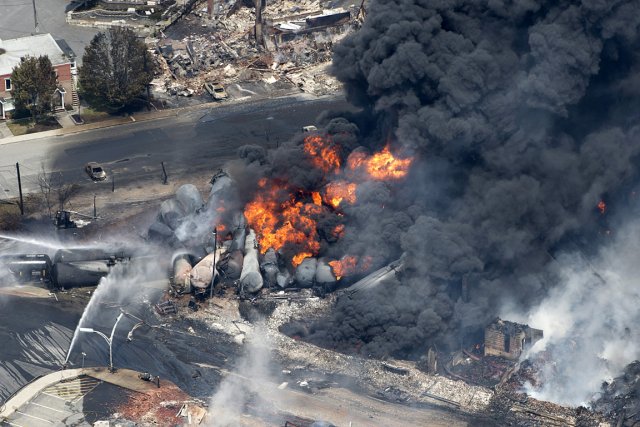
On July 6, 2013, a Montreal Maine and Atlantic train carrying 72 cars of crude oil slipped downhill, derailed and exploded near downtown Lac-Mgantic, Qubec. The explosion and resulting fires killed 47 people, caused massive destruction and resulted in the evacuation of thousands. In addition, the Chaudire River was contaminated by an estimated 100,000 litres of oil.
Almost a year later, prosecutors announced the arrest of three individuals on criminal negligence charges’sometimes called ‘C-45 charges”related to the derailment.
Late May 12, 2014, a spokesman for’s director of criminal and penal prosecutions said 47 counts of criminal negligence causing death had been filed against:
- Thomas Harding (the train’s engineer or driver)
- Jean Demaitre (manager of train operations)
- Richard Labrie (railway traffic controller).
The government also charged Montreal Maine and Atlantic Railway Ltd., which filed for bankruptcy in the wake of the disaster and is currently up for sale. However, no one in senior management is currently facing charges,
The police investigation is ongoing and it’s possible that other charges could be laid in connection with the derailment. In addition, the Transportation Safety Board’s own investigation is still ongoing.
Given the magnitude of this incident, it’s not surprising that criminal negligence charges were brought. And the fact the incident occurred in Qubec, which has been more aggressive than any other jurisdiction in bringing criminal negligence charges for workplace safety incidents, also made it likely that such charges were coming.
Other provinces are getting a bit more active in this area, though.
For example, Ontario recently laid criminal negligence charges against a professional engineer as a result of the collapse of part of a mall, which killed two people.
And a ferry boat officer in BC was convicted last May of criminal negligence for the sinking of the ferry and disappearance’and presumed deaths’of two passengers.
Go to the OHS Insider’s C-45 Compliance Centre for detailed information on criminal negligence, including answers to 10 frequently asked questions about such charges.


Leave A Comment